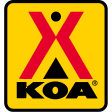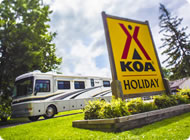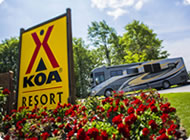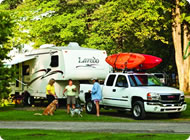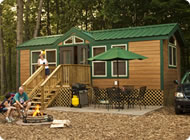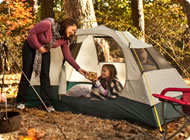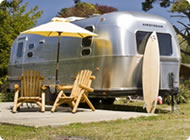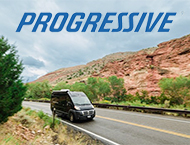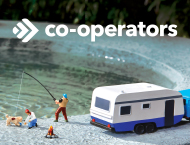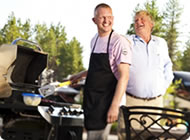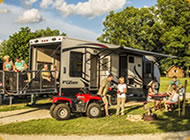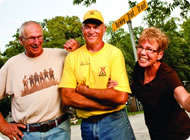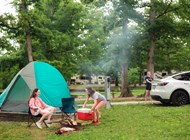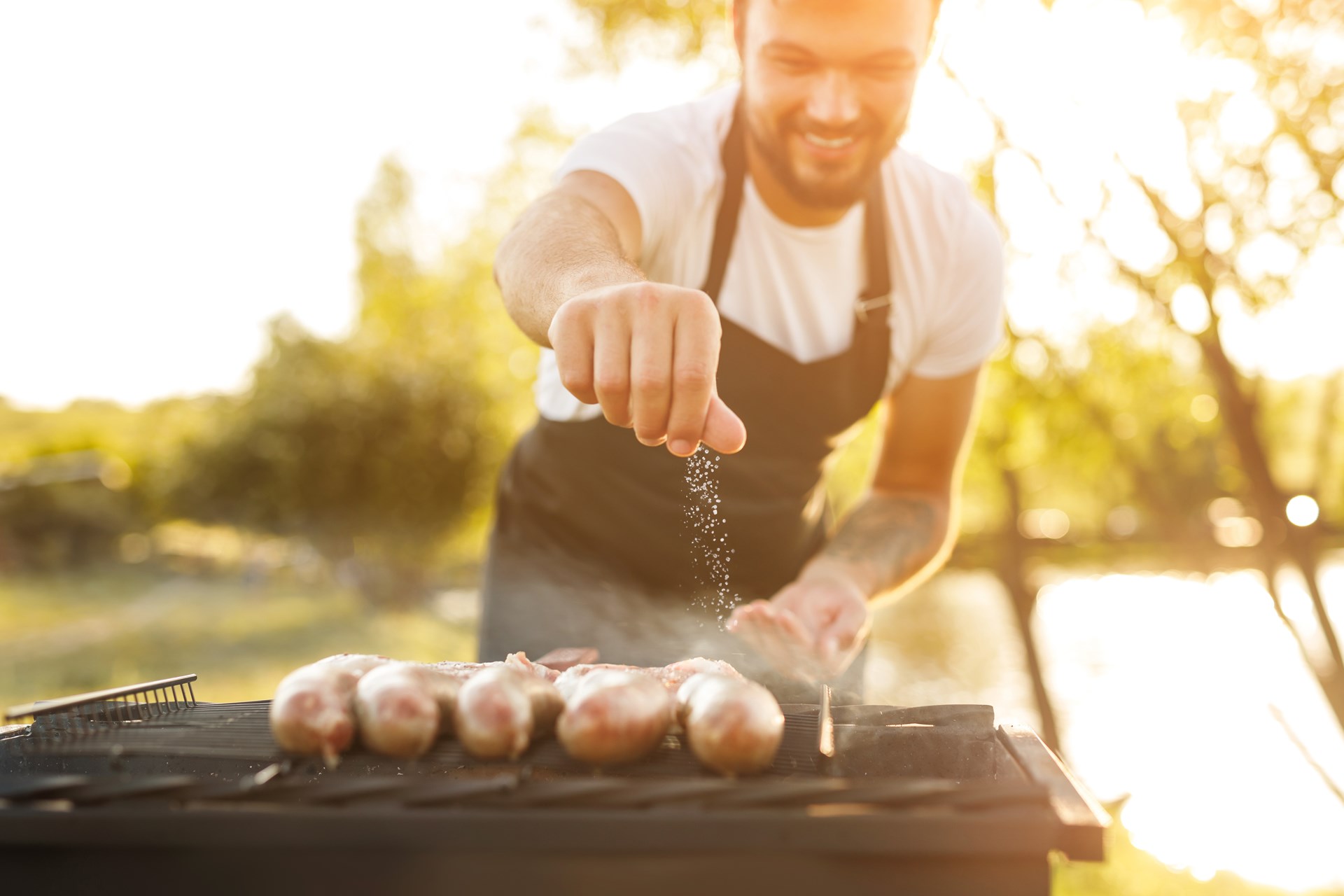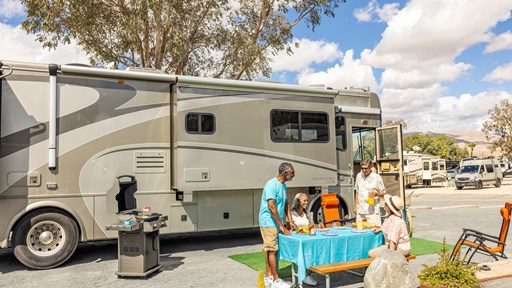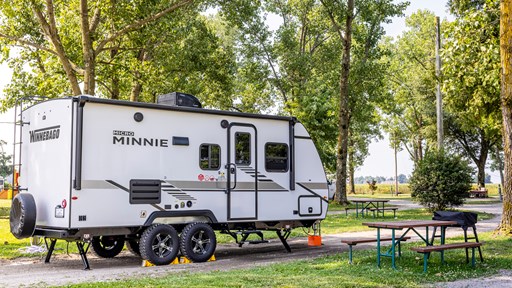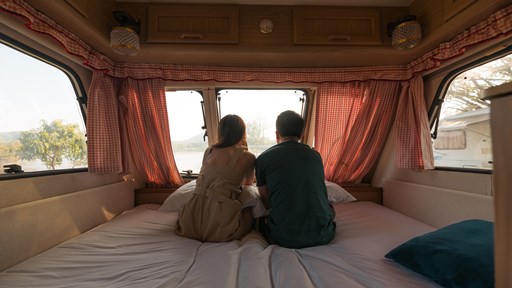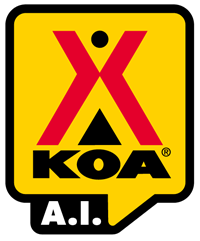Portable camping grills are easy to move and store in your RV, making for unforgettable camping trips. The right type of grill depends on your preferences, cooking style, available space and the number of campers. Learn more about the best RV camping grills and how to pick the perfect one for you.
Choosing the Perfect Grill for Your RV
Focus on these factors to select the best RV grill for your upcoming adventures:
- Portability: An RV camping grill should be easy to transport. The best RV grills are compact, lightweight, collapsible and wheeled for easy maneuverability and packing.
- Size: Consider your RV’s storage space and how many people you plan to cook for. A smaller, more compact RV grill is perfect for a smaller group or family with limited storage space, but you can opt for a larger portable grill if you have ample storage space and cook for a bigger number of people. Whatever type of grill you choose, take measurements to make sure the grill and accessories will fit in your storage space.
- Quality and cooking features: Durability, longevity and convenient features are also essential. Choose a grill with excellent reviews to ensure it will last long and meet your expectations. Many grills feature non-stick surfaces to make grilling and cleaning easier.
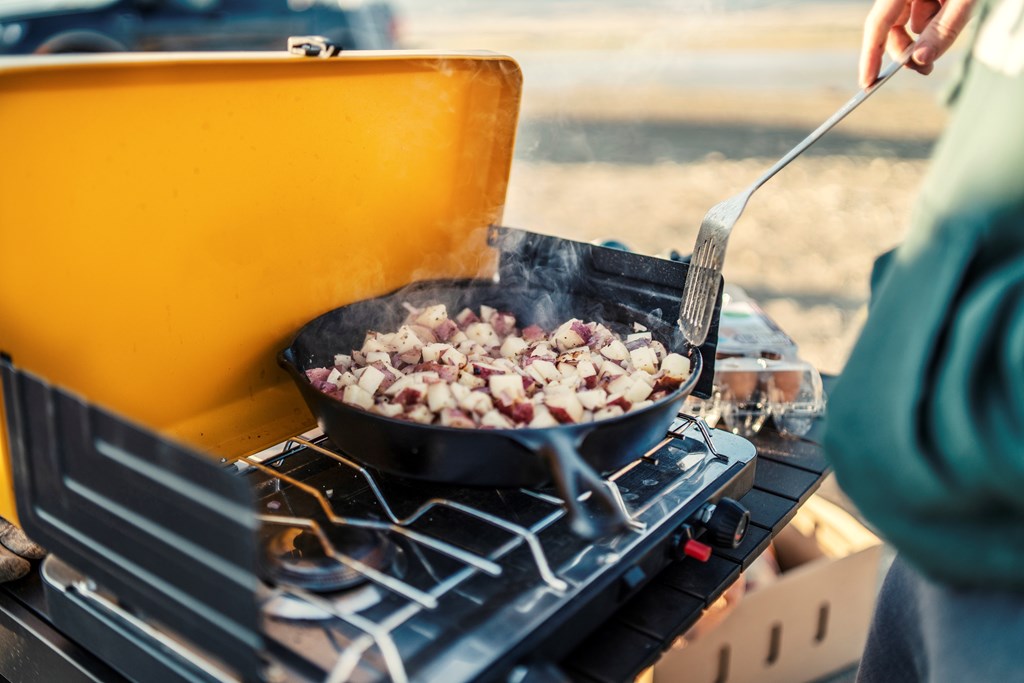
Types of Portable Camping Grills
Before choosing the perfect grill for your camping excursions, it’s helpful to understand the different types of grills available. Choose one of the following types based on your personal RV grilling style and preference.
Charcoal
Nothing beats the smoky, chargrilled flavor you get from cooking over charcoal. The kettle-type charcoal grill is a popular choice because grilling food under a cover reduces cooking time and increases the smoked flavor. It’s actually an oven, smoker and grill all in one, making it a versatile choice for camping.
Propane
A propane grill is more convenient than a charcoal grill because it heats up faster and there is no need to carefully dispose of hot coals before leaving the campground. Portable propane grills can be fueled with disposable propane canisters. For a more economical and eco-friendly option, purchase an adapter hose so you can hook up your grill to a refillable propane tank. Propane grills are by far the most popular RV camping grills.
Electric
With an electric grill, you don’t have to worry about replenishing fuel or inhaling fumes. Simply plug in to any power source and start grilling. Electric grills come in a variety of colors and sizes, are easy to assemble and can be stored away in minutes. If you are at a campground that provides electrical hookups and includes the cost of power, you can operate this grill without spending a dime.
Best Camping Grills to Buy
The following grills are fantastic options for your next camping trip.
Masterbuilt Electric Portable Charcoal Grill
Masterbuilt’s Electric Portable Charcoal Grill features a removable, collapsible cart for easy storage and transport. Its stainless steel interior surfaces resist corrosion and rust and are easy to clean. Stainless steel distributes heat evenly, and the grill’s SteadyTemp dial helps you accurately adjust the temperature between 250 and 500 degrees Fahrenheit. With this dependable grill, you can cook the perfect juicy steaks, grill some savory burgers or prepare delicious scrambled eggs.
Weber Go-Anywhere Charcoal Grill
Weber’s Go-Anywhere Charcoal Grill is an excellent budget-friendly grill. It is small and lightweight, and its lid locks double as legs for easy storage and portability. You can cook up to six burgers at a time on the grill’s plated steel grates, which are highly durable and easy to clean.
PK Grills Portable Charcoal BBQ Grill and Smoker
The PK Grills Portable Charcoal BBQ Grill and Smoker is highly versatile with two-zone grilling capabilities. Whether you need direct high heat for mouthwatering steaks or indirect low heat for slow cooking, its exclusive venting shape makes this grill ideal for both. The Portable Charcoal BBQ Grill and Smoker also features a digital thermometer probe access door, so you can monitor your camping meals for perfection.
Weber Q1200 Liquid Propane Grill
The Weber Q1200 Liquid Propane Grill is compact, making it the perfect option for RVs with limited storage. It fits nicely on tabletops and tailgates and holds one-pound propane cylinders. It is also easy to use and features cast-iron grates for durability, even grilling and beautiful sear marks.
Weber Traveler Portable Gas Grill
Weber’s Traveler Portable Gas Grill is the ideal choice for large camping groups. Whether you travel with a big family or invite friends to a campfire, you can cook up to 15 burgers at a time on the grill’s large cooking surface. It’s also easy to transport and store with collapsible legs that enable it to lay flat.
Ninja OG951 Woodfire Pro Connect Premium XL Outdoor Grill and Smoker
Ninja’s OG951 Woodfire Pro Connect is an electric grill that uses wood-burning pellets to give your meals a delicious campfire taste. It’s a highly versatile option you can use to grill, BBQ, roast, air fry, broil, bake or dehydrate from your campsite. This impressive grill’s Bluetooth technology, built-in thermometers and ProConnect app make it easy to monitor your food with real-time notifications and get the perfect results. Its cooking surface can fit up to 10 burgers, but it is compact enough for easy transport and storage.
Weber Q2400 Electric Grill
The Weber Q2400 Electric Grill is compact and comes fully assembled for easy use. Its porcelain-enameled cast-iron grates and infinite control burner valve settings facilitate precise control and even cooking. This quality grill also features a six-foot grounded cord for convenient placement and use in any campsite.
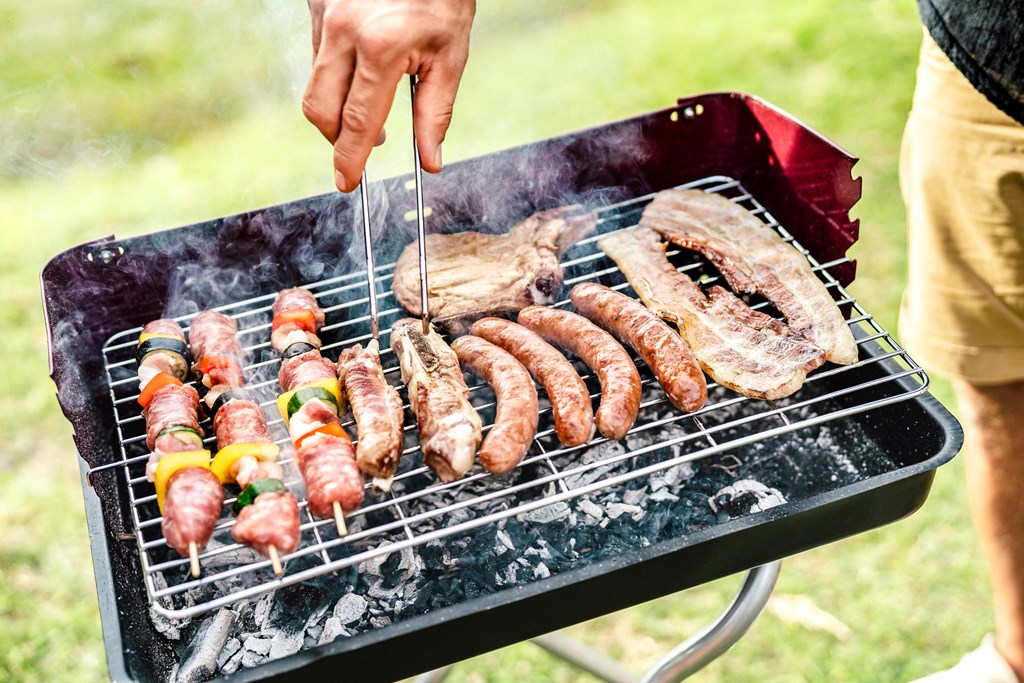
Must-Have Grilling Features and Accessories
The following grill features and accessories can enhance your outdoor cooking experience and protect your grill:
- Durable finish: A stainless steel or enamel finish will protect your grill from rusting in damp climates.
- Built-in thermometer: A built-in temperature gauge is very helpful, especially on propane grills where you might run out of fuel without realizing it.
- Side tables: Fold-up side tables come in handy for prep work and moving food on and off the grill.
- Grill cover: A grill cover will help protect your grill and minimize upkeep.
- Grill stand: A grill stand lets you use your grill anywhere you want.
- Charcoal starters: Charcoal starters are chimney-shaped cones that make lighting charcoal safe and easy—all you need is a match and a wad of newspaper.
Grilling Tools You Will Love
The right tools make grilling a fun camping activity. Here are some camper favorites:
- Spring-loaded tongs: Stainless steel spring-loaded tongs grip food better than one-piece tongs.
- Spatulas: Spatulas are perfect for flipping fish filets or other delicate foods.
- Grill mats: Grill mats keep your grill racks cleaner and are ideal for cooking fish.
- Grill tray: A grill tray keeps veggies and other smaller food items from falling through the grates.
- Wooden skewers: Skewers are a must for grilling meat and/or vegetable kabobs. Soak them in water for 20 to 30 minutes prior to use to keep them from burning.
- Instant-read meat thermometer: A digital instant-read meat thermometer helps you measure internal temperatures quickly.
- Wire or nylon grill brush: Grill brushes make it easy to clean your grill. If your grill has a nonstick surface, opt for a softer nylon grill brush to avoid damaging the nonstick coating.
Keeping Your Grill Clean
Cleaning your grill grate between meals helps you maintain delicious flavors in all of the food you cook. Consider the following tips to keep your grill clean:
- Use a wire grill brush: A sturdy wire grill brush with brass bristles removes residue from your grill quickly and easily. Preheat the grate and brush vigorously a few times with a stiff-bristled wire brush to knock off any rust, ash, or burnt-on debris. Dislodge any really stubborn debris with the metal scraper that is often attached to the end of your grill brush.
- Burn off food residue before cleaning: If you have a propane grill, you may prefer to burn off food residue by raising the heat to high for 5 to 10 minutes after grilling. This method helps remove most of the residue, and you can clean any remaining residue with a brush.
- Use non-toxic cleaners: If you choose to use a spray-on cleaner, opt for a nontoxic one like Simple Green BBQ Cleaner. Do not preheat the grill. Spray the cold grill and let the cleaner do its thing for a minute or two before brushing.
- Use a drip pan: Keep the dry tray clean with a disposable foil drip pan or make your own using heavy-duty aluminum foil. Remember to dispose of the used drip pan before leaving the campground to avoid making a mess while in transport.
Enjoy a Greater Slice of the Great Outdoors
RV grilling is one of the best parts of camping. The smell of delicious burgers, sizzling steaks and grilled veggies are comforting after an adventure-filled day. Kampgrounds of America offers fun and relaxing camping locations across North America, featuring RV Sites with various hookups where you can cook in the great outdoors. Reserve a stay at KOA to start your RV vacation and prepare your favorite camping foods.
About the Author: Kampgrounds of America
Kampgrounds of America is the largest system of open-to-the-public campgrounds in the world, with over 500 locations across the United States and Canada. Founded in Billings, MT in 1962, KOA’s family of campground brands – KOA Journey, KOA Holiday and KOA Resort – today serve more than a million camping families each year. KOA is dedicated to “connecting people to the outdoors and each other” by providing people with a variety of camping experiences and the information they need to make the most of their camping trip. Read more of their camping and travel resources by visiting KOA.com/blog.
Kampgrounds of America, Inc. is a participant in the Amazon Services LLC Associates Program, and affiliate advertising program. Some links may be affiliate links and Kampgrounds of America, Inc may get paid if you buy something or take an action after clicking one of these links.
Prices are accurate at time of publishing. Note that they are subject to change at the discretion of Amazon or their marketplace sellers.



